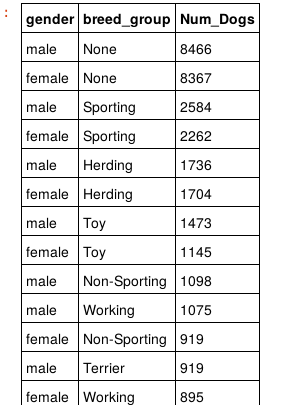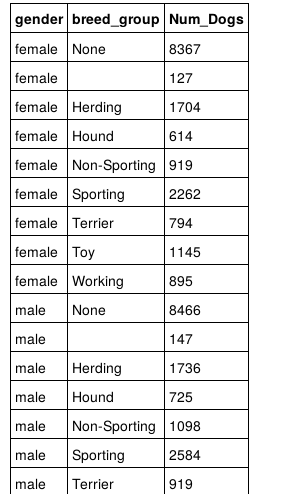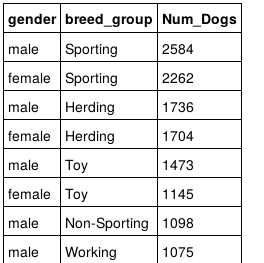1. GROUP BY
GROUP BY 一般在WHERE之后,在 ORDER BY 和 LIMIT之前。
Q1:
%%sql SELECT gender, breed_group, COUNT(DISTINCT dog_guid) AS Num_Dogs FROM dogs GROUP BY gender, breed_group ORDER BY Num_Dogs DESC

去掉ORDER。
%%sql SELECT gender, breed_group, COUNT(DISTINCT dog_guid) AS Num_Dogs FROM dogs GROUP BY gender, breed_group

数字简写。
SELECT test_name, MONTH(created_at) AS Month, COUNT(created_at) AS Num_Completed_Tests ''' test_name would be #1, Month would be #2, and Num_Completed_Tests would be #3 ''' SELECT test_name, MONTH(created_at) AS Month, COUNT(created_at) AS Num_Completed_Tests FROM complete_tests GROUP BY 1, 2 ORDER BY 1 ASC, 2 ASC;
2. HAVING用法。
""" If you then wanted to output only the test-month pairs that had at least 20 records in them, you would add a HAVING clause, because the stipulation of at least 20 records only makes sense and is only computable at the aggregated group level """ SELECT test_name, MONTH(created_at) AS Month, COUNT(created_at) AS Num_Completed_Tests FROM complete_tests WHERE MONTH(created_at)=11 OR MONTH(created_at)=12 GROUP BY 1, 2 HAVING COUNT(created_at)>=20 ORDER BY 3 DESC;
Q3:
%%sql SELECT gender, breed_group, COUNT(DISTINCT dog_guid) AS Num_Dogs FROM dogs WHERE breed_group != "" AND breed_group IS NOT NULL AND breed_group != "None" GROUP BY 1,2 HAVING Num_Dogs >= 1000 ORDER BY 3 DESC

Q6:
%%sql SELECT COUNT(user_guid), state, ZIP FROM users WHERE country = "US" GROUP BY 2, 3 ORDER BY 2 ASC, 3 DESC LIMIT 10;